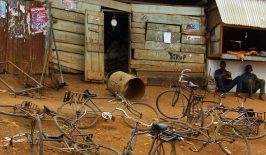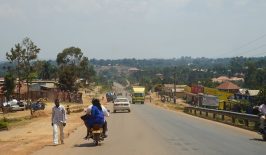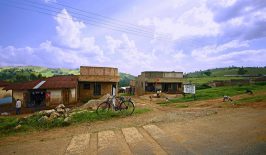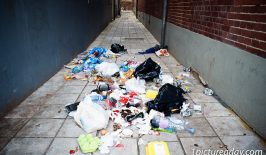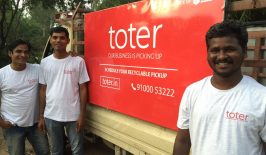Reagan, what is EcoAction all about? What do you do and what are your goals?
EcoAction works with marginalized people in the city, especially women, mostly in slums in Kampala, to investigate different innovative ways of using of waste and how it can be used to create new opportunities for income, i.e. through innovative waste management. Our main goal is to create a waste-free environment by asking questions like: How can people change their mindset when it comes to waste? How can we use these synergies to improve the lives of marginalized people, who are pushed to the margins of society, and who earn their living as garbage and plastic collectors and at the same time clean up the environment? We want to make people think about these issues by carrying out practical, innovative and provocative projects – like setting up art installations in public made of garbage and plastic in order to stimulate discussion around the topic. But we also focus on the high levels of youth unemployment, as marginalized communities in the country increase in size and more young people come to the cities in search of work. And we don’t just work in Kampala. We have already carried out projects in other parts of Uganda, in conflict regions such as northern Uganda and also in prisons.
What do your projects look like? What tools do you use?
It all depends. Normally we use art as a medium, like by creating murals. For these murals we try to integrate the community. But we also work together with plastic collectors. We really appreciate what they are doing, but we also show them what else they can do to increase the impact of their work. That means collecting the garbage, and also sorting, recycling and separating the organic from the inorganic waste. So there is an artistic part of the project, but there is also a practical part where we sort, recycle and make products out of the waste. We also organise discussions, workshops and street events where young people and other people from universities or abroad come together to discuss climate change and environmental issues.
What does the life of a plastic collector look like, can you give me some insight?
One of the women we work with is Joanne, a single mother of three children. Her children weren’t going to school because Joanne couldn’t pay her children’s school fees. She got up early every morning and walked about 30 kilometres a day to collect plastic. Every day she managed to collect seven kilograms of plastic bottles – that’s less than a dollar worth. What really impressed me about Joanne’s work was the energy she put into collecting all this waste. So I thought, “Someone has to give Joanne a voice. Someone has to give her hope. Because Joanne was a woman who wasn’t proud of what she was doing; who felt she couldn’t be with people who weren’t garbage collectors. And I’m an artist, I have an ability, I have the time, I can change Joanne’s life and the lives of other Joannes elsewhere. We started with small things where we could offer support. We told Joanne about the concept of urban gardening. Joanne couldn’t feed herself and her family enough on the one dollar a day she earned. She starting growing different kinds of vegetables on a small patch of land and after two months she was able to harvest things from the garden. She was able to feed her family using that, and also sell some of the other things she had grown. Together with the income from the plastic bottles she was able to send two of her children to school.

